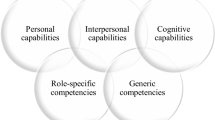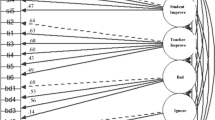Abstract
Brazilian higher education institutions face a complex and challenging environment as the national market in education is becoming more competitive. International investment, a decrease in the population of potential students, and the proliferation of innumerable small institutions add to this complexity. Organizations are becoming flatter and the key managers within them are deans. Although deans are required to act as managerial experts, they are usually selected from the teaching body of the institution. In this paper, a group of deans from a large private institution gave their self-assessment of their academic and managerial skills. The results revealed that they tend to have a high perception of their managerial skills, even though they have no previous managerial experience or formal training. This underlines that senior academic administrators cannot simply assume that deans, by the nature of their work environment, are proficient in managerial skills; neither that they can easily identify inadequacies nor have them self-corrected. To accomplish the necessary institutional changes to face the complexities of the current globalized education market, a new assessment culture has to be implemented in the academic environment.
Similar content being viewed by others
References
Ackerman, P. L., Kanfer, R., & Goff, M. (2002). What we really know about our abilities and our knowledge. Personality and Individual Differences, 33, 587–605.
Anderson, L. W., & Krathwohl, D. R. (Eds.). (2001). A taxonomy for learning, teaching, and assessing: A revision of Bloom’s taxonomy of educational objectives. New York: Addison Wesley Longman.
Boud, D., & Falchikov, N. (1989). Quantitative studies of student self-assessment in higher education: A critical analysis of findings. Higher Education, 18, 529–549.
de Boer, H., & Goedegebuure, L. (2006). On limitations and consequences of change: Dutch University governance in transition. Tertiary Education and Management, 7, 163–180.
Deem, R. (2004). The knowledge worker, the manager-academic and the contemporary UK University: New and old forms of public management. Financial Accountability & Management, 20, 107–128.
Dibden, A. J. (1968). Academic deanship in American Colleges and Universities. Carbondale and Edwardsville, IL: Southern Illinois University Press.
Dunning, D. (2006). Strangers to ourselves? Psychologist, 19, 600–603.
Dunning, D., Heath, C., & Suls, J. M. (2004). Flawed self-assessment: Implications for health, education, and the workplace. Psychological Science in the Public Interest, 5, 69–106.
Durand, J., & Pujadas, C. (2004). Self-assessment of governance teams in an Argentine private university: Adapting to difficult times. Tertiary Education and Management, 10, 27–44.
Ehrlinger, J. (2008). Skill level, self-views and self-theories as sources of error in self-assessment. Social and Personality Psychology Compass, 2(1), 382–398.
Feltner, B. D., & Goodsell, D. R. (1972). The academic dean and conflict management. Journal of Higher Education, 43, 692–701.
Galbo, C. (1998). Helping adults learn. Thrust for Educational Leadership, 27, 13–15, 35–37.
Gillet-Karam, R. (1999). Midlevel management in the Community College: A Rose Garden? In R. Gillet-Karam (Ed.), New directions for community colleges (pp. 5–11). San Francisco, CA: Jossey-Bass.
Glasman, N. S., & Heck, R. H. (1996). Role-based evaluation of principals: Developing an appraisal system. In K. Leithwood, J. Chapman, D. Corson, P. Hallinger, & A. Hard (Eds.), International handbook of educational leadership and administration (pp. 369–394). Boston, MA: Kluwer.
Gmelch, W. H., & Miskin, V. D. (1993). Strategic leadership skills for department chairs. Boston, MA: Anker.
Gmelch, W. H., Wolverton, M., & Wolverton, M. L. (1999). The impact of role conflict and ambiguity on academic deans. Journal of Higher Education, 70, 80–106.
Hannan, M. T., & Freeman, J. (1989). Organizational ecology. Cambridge: Harvard University Press.
Heck, R. H., Johnsrud, L. K., & Rosser, V. J. (2000). Administrative effectiveness in higher education: Improving assessment procedures. Research in Higher Education, 41, 663–684.
Holm-Nielsen, L. B., Thorn, K., Brunner, J. J., & Balan, J. (2005). Regional and international challenges to higher education in Latin America. In H. de Witt, I. C. Jaramillo, J. Gacel-Avila, & J. Knight (Eds.), Higher education in Latin America. The international dimension (pp. 39–69). Washington, DC: World Bank. https://doi.org/siteresources.worldbank.org/INTLACREGTOPEDUCATION/Resources/Overview_of_HE_in_LAC.pdf. Retrieved June 15, 2008.
Huisman, J., de Boer, H., & Goedegebuure, L. (2006). The perception of participation in executive governance structures in Dutch universities. Tertiary Education Management, 12, 227–239.
Katz, R. L. (1955). Skills of an effective administrator. Harvard Business Review, 33, 33–42.
Kogan, M., & Hanney, S. (2000). Reforming higher education. London: Jessica Kingsley.
Kruger, J., & Dunning, D. (1999). Unskilled and unaware of it: How difficulties in recognizing one’s own incompetence lead to inflated self-assessments. Journal of Personality and Social Psychology, 77, 1121–1134.
Lapworth, S. (2004). Arresting decline in shared governance: Towards a flexible model for academic participation. Higher Education Quarterly, 58, 299–314.
Lazzeretti, L., & Tavoletti, E. (2006) Governance shifts in higher education: A cross-national comparison. European Educational Research Journal, 5, 18–37.
Marginson, S., & Considine, M. (2000). The Enterprise University: Power, governance and reinvention in Australia. Melbourne: Cambridge University Press.
Meek, V. L. (2003). Governance and management of Australian higher education: Enemies within and without. In A. Amaral, V. L. Meek, & I. M. Larsen (Eds.), The Higher Education managerial revolution? (Higher Education Dynamics) (pp. 179–202). Dordrecht: Kluwer.
Mignot-Gérard, S. (2002). Deconstructing leadership and governance systems within universities. Paper presented at the Consortium of Higher Education Researchers 15 th Annual Conference, Vienna. https://doi.org/74.125.95.104/search?q=cache:yOhFYidziMIJ:; https://doi.org/www.iff.ac.at/hofo/CHER_2002/pdf/ch02mign.pdf+%22Mignot+G%C3%A9rard%22+%22Deconstructing+Leadership+*+ Governance%22&hl=p+-BR&ct=clnk&cd=1&gl=br. Retrieved October 14, 2008.
Morris, V. C. (1981). Deaning. Chicago, IL: University of Illinois.
Norusis, M. J. (1994). SPSS professional statistics 6.1. Englewood Cliffs, NJ: Prentice Hall.
Peterson, T. O., & van Fleet, D. D. (2004). The ongoing legacy of RL Katz: An updated typology of management skills. Management Decision, 42, 1297–1308.
Pickard, M. J. (2007). The new Bloom’s taxonomy: An overview for family and consumer sciences. Journal of Family and Consumer Sciences Education, 25, 45–55.
Quinn, R. E., Faerman, S. R., Thompson, M. P., & McGrath, M. (2004). Competências Gerenciais. Campinas: Campus.
Rich, D. (2006). Academic leadership and the restructuring of higher education. New directions for higher education, 134, 37–48.
Rosser, V. J., Johnsrud, L. K., & Heck, R. H. (2003). Academic deans and directors: Assessing their effectiveness from individual and institutional perspectives. Journal of Higher Education, 74, 1–25.
Santiago, R., Carvalho, T., Amaral, A., & Meek, V. L. (2006). Changing in the middle management of higher education institutions: The case of Portugal. Higher Education, 52, 215–250.
Sarros, J. C., Gmelch, W. H., & Tanewski, G. A. (1998). The academic dean: A position in need of compass and clock. Higher Education Research & Development, 17, 65–88.
Sundström, A. (2005). Self-assessment of knowledge and abilities: A literature study. [Monograph on the internet]. Umeâ: Department of Educational Measurement, Umeâ University [cited 2007, December 5]. 54:43. https://doi.org/www.umu.se/edmeas/publikationer/pdf/EM541.pdf Retrieved April 7, 2008.
Sundström, A. (2006). Beliefs about perceived competence: A literature review. [Monograph on the internet]. Umeâ: Department of Educational Measurement, Umeâ University [cited 2007, December 5]. 55:72. https://doi.org/www.umu.se/edmeas/publikationer/pdf/Em%20nr%2055.pdf Retrieved April 7, 2008.
Tucker, A., & Bryan, R. A. (1991). The academic dean: Dove, dragon, and diplomat. New York: American Council of Education and Macmillan.
Twombly, S. B. (1992). The process of choosing a dean. Journal ofHigher Education, 63, 654–683.
Waugh, W. L., Jr. (2003). Issues in university governance: More “professional” and less academic. ANNALS of the American Academy of Political and Social Science, 585, 84–96.
Wolverton, M., Montez, J., & Gmelch, W. H. (2000). The roles and challenges of deans. Paper presented at the Annual Meeting of the Association for the Study of Higher Education, Sacramento, CA [cited 2007, August 8]. https://doi.org/eric.ed.gov/ERICDocs/data/ericdocs2sql/content_storage_01/0000019b/80/16/d4/58.pdf Retrieved December 15, 2007.
Wolverton, M., & Poch, S. (2000). The nexus between academic deans and corporate CEOs: An opportunity in the making. Paper presented at the Annual Meeting of the American Education Research Association, New Orleans, LA [cited 2007, August 5]. https://doi.org/eric.ed.gov/ERICDocs/data/ericdocs2sql/content_storage_01/0000019b/80/16/44/7b.pdf Retrieved December 15, 2007.
Wolverton, M., Wolverton, M. L., & Gmelch, W. H. (1999). The impact of role conflict and ambiguity on academic deans. Journal of Higher Education, 70, 80–106.
Author information
Authors and Affiliations
Corresponding author
Rights and permissions
About this article
Cite this article
Vieira da Motta, M., Bolan, V. Academic and Managerial Skills of Academic Deans: A self-assessment perspective. Tert Educ Manag 14, 303–316 (2008). https://doi.org/10.1080/13583880802481740
Published:
Issue Date:
DOI: https://doi.org/10.1080/13583880802481740




